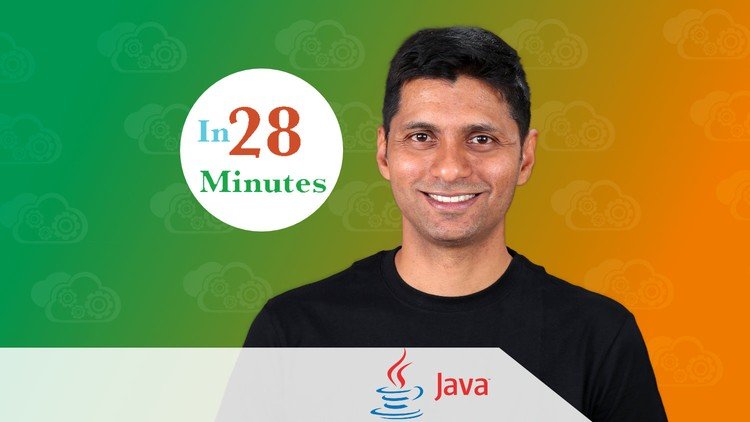Java Programming for Complete Beginners
- Description
- Curriculum
- FAQ
- Reviews
LEARN JAVA PROGRAMMING WRITING 200+ JAVA PROGRAMS, PUZZLES & EXERCISES.
RECOMMENDED for absolute beginners to Java and Programming!
BONUS – Learn to Build REST API with Spring, Spring Boot, and JPA
7 Things YOU need to know about this JAVA PROGRAMMING Course
#1: 150,000+ Learners – One of the highest-rated Java Courses on Udemy!
#2: Designed for ABSOLUTE BEGINNERS to Java Programming (Core + Advanced)
#3: HANDS-ON – Write 100+ Programs – The best way to learn Java Programming is to get your hands dirty!
#4: PUZZLES and EXERCISES to help reinforce your learning
#5: One of the first courses to be updated to JAVA 16. Covers all new features in Java 9, Java 10, Java 11, Java 12, Java 13, Java 14, Java 15, and Java 16.
#6: FREE 150 Page Course Companion Web Site
#7: BONUS – Learn to Build REST API with Spring, Spring Boot, and JPA (Hibernate)
WHAT OUR LEARNERS ARE SAYING:
5 STARS – The best Java course out there for Beginners. Highly recommended.
5 STARS – This course exceeded all my expectations. HIGHLY RECOMMENDED!
5 STARS – Great mix of theory and exercises!
5 STARS – What a great course!!!
5 STARS – This is the best Java course I’ve come across. It’s straight to the point without any missing details. You can get an idea of what you’re getting into working with Java fast with this course. I really like it.
5 STARS – Never thought taking an online course will be so helpful. The instructor is quite engaging, gives a good amount of exercises.
5 STARS – This course is wonderful! I really enjoy it. It really is for beginners, so it’s very helpful for people which don’t know anything about programming.
5 STARS – It’s very well thought out. I enjoy the constant exercises and the challenge they present to make things happen.
COURSE OVERVIEW
Java is one of the most popular programming languages. Java offers both object-oriented and functional programming features.
We take a hands-on approach using a combination of JShell and Eclipse as an IDE to illustrate more than 200 Java Coding Exercises, Puzzles, and Code Examples. This course assumes no previous ( beginner ) programming or Java experience. If you’ve never programmed a computer before, or if you already have experience with another programming language and want to quickly learn Java, this is a perfect course for you.
In more than 250 Steps, we explore the most important Core Java Programming Language Features
-
Basics of Java Programming – Expressions, Variables, and Printing Output
-
Java Operators – Java Assignment Operator, Relational and Logical Operators, Short Circuit Operators
-
Java Conditionals and If Statement
-
Methods – Parameters, Arguments, and Return Values
-
Object-Oriented Programming – Class, Object, State, and Behavior
-
Basics of OOPS – Encapsulation, Abstraction, Inheritance, and Polymorphism
-
Basics about Java Data Types – Casting, Operators, and More
-
Java Built-in Classes – BigDecimal, String, Java Wrapper Classes
-
Conditionals with Java – If Else Statement, Nested If Else, Java Switch Statement, Java Ternary Operator
-
Loops – For Loop, While Loop in Java, Do While Loop, Break and Continue
-
Immutability of Java Wrapper Classes, String and BigDecimal
-
Java Dates – Introduction to LocalDate, LocalTime and LocalDateTime
-
Java Array and ArrayList – Java String Arrays, Arrays of Objects, Primitive Data Types, toString and Exceptions
-
Introduction to Variable Arguments
-
Basics of Designing a Class – Class, Object, State and Behavior. Deciding State and Constructors.
-
Understanding Object Composition and Inheritance
-
Java Abstract Class and Interfaces. Introduction to Polymorphism.
-
Java Collections – List Interface(ArrayList, LinkedList and Vector), Set Interface (HashSet, LinkedHashSet and TreeSet), Queue Interface (PriorityQueue) and Map Interface (HashMap, HashTable, LinkedHashMap and TreeMap() – Compare, Contrast and Choose
-
Generics – Why do we need Generics? Restrictions with extends and Generic Methods, WildCards – Upper Bound and Lower Bound.
-
Functional Programming – Lambda Expression, Stream and Operations on a Stream (Intermediate Operations – Sort, Distinct, Filter, Map and Terminal Operations – max, min, collect to List), Functional Interfaces – Predicate Interface, Consumer Interface, Function Interface for Mapping, Method References – static and instance methods
-
Introduction to Threads and MultiThreading – Need for Threads
-
Implementing Threads – Extending Thread Class and Implementing Runnable Interface
-
States of a Thread and Communication between Threads
-
Introduction to Executor Service – Customizing the number of Active Threads. Returning a Future, invokeAll, and invokeAny
-
Introduction to Exception Handling – Your Thought Process during Exception Handling. try, catch, and finally. Exception Hierarchy – Checked Exceptions vs Unchecked Exceptions. Throwing an Exception. Creating and Throwing a Custom Exception – CurrenciesDoNotMatchException. Try with Resources – New Feature in Java 7.
-
List files and folders in Directory with Files list method, File walk method and find methods. Read and write from a File.
Start Learning Now. Hit the Enroll Button!
-
9Step 00 - Step By Step Problem Solving with ProgrammingVideo lesson
-
10Step 01 - Introduction to Multiplication Table challengeVideo lesson
-
11Step 02 - Getting Started with JShellVideo lesson
-
12Step 03 - Break Down Multiplication Table ChallengeVideo lesson
-
13Step 04 - Java Expression - An IntroductionVideo lesson
-
14Step 05 - Java Expression - ExercisesVideo lesson
-
15Step 06 - Java Expression - PuzzlesVideo lesson
-
16Section Quiz 1Quiz
-
17Step 07 - Printing output to console with JavaVideo lesson
-
18Step 08 - Printing output to console with Java - Exercise StatementsVideo lesson
-
19Do You Want to Help Us?Text lesson
-
20Step 09 - Printing output to console with Java - Exercise SolutionsVideo lesson
-
21Step 10 - Printing output to console with Java - PuzzlesVideo lesson
-
22JShell Tip - Multiple Lines of CodeVideo lesson
-
23Step 11 - Advanced Printing output to console with JavaVideo lesson
-
24Step 12 - Advanced Printing output to console with Java - ExercisesVideo lesson
-
25Section Quiz 2Quiz
-
26Step 13 - Introduction to Variables in JavaVideo lesson
-
27Step 14 - Introduction to Variables in Java - Exercises and PuzzlesVideo lesson
-
28Step 15 - 4 Important Things to Know about Variables in JavaVideo lesson
-
29Step 16 - How are variables stored in memory?Video lesson
-
30Step 17 - How to name a variable?Video lesson
-
31Section Quiz 3Quiz
-
32Step 18 - Understanding Primitive Variable Types in JavaVideo lesson
-
33Step 19 - Understanding Primitive Variable Types in Java - Choosing a TypeVideo lesson
-
34Java Tip - String ConcatenationVideo lesson
-
35Step 20 - Java Assignment OperatorVideo lesson
-
36Step 21 - Java Assignment Operator - Puzzles on Increment, Decrement and CompounVideo lesson
-
37Step 22 - Programming Tips : JShell - Shortcuts, Multiple Lines and VariablesVideo lesson
-
38Section Quiz 4Quiz
-
39Step 23 - Java Conditionals and If Statement - IntroductionVideo lesson
-
40Step 24 - Java Conditionals and If Statement - Exercise StatementsVideo lesson
-
41Step 25 - Java Conditionals and If Statement - Exercise SolutionsVideo lesson
-
42Step 26 - Java Conditionals and If Statement - PuzzlesVideo lesson
-
43Step 27 - Java For Loop to Print Multiplication Table - IntroductionVideo lesson
-
44Step 28 - Java For Loop to Print Multiplication Table - Exercise StatementsVideo lesson
-
45Step 29 - Java For Loop to Print Multiplication Table - Exercise SolutionsVideo lesson
-
46Step 30 - Java For Loop to Print Multiplication Table - PuzzlesVideo lesson
-
47Step 31 - Getting Started with Programming - Revise all TerminologyVideo lesson
-
48Section Quiz 5Quiz
-
49Step 00 - Section 02 - Methods - An IntroductionVideo lesson
-
50Step 01 - Your First Java Method - Hello World Twice and Exercise StatementsVideo lesson
-
51Step 02 - Introduction to Java Methods - Exercises and PuzzlesVideo lesson
-
52Step 03 - Programming Tip - Editing Methods with JShellVideo lesson
-
53Step 04 - Introduction to Java Methods - Arguments and ParametersVideo lesson
-
54Step 05 - Introduction to Java Method Arguments - ExercisesVideo lesson
-
55Step 06 - Introduction to Java Method Arguments - Puzzles and TipsVideo lesson
-
56Step 07 - Getting back to Multiplication Table - Creating a methodVideo lesson
-
57Step 08 - Print Multiplication Table with a Parameter and Method OverloadingVideo lesson
-
58Step 09 - Passing Multiple Parameters to a Java MethodVideo lesson
-
59Step 10 - Returning from a Java Method - An IntroductionVideo lesson
-
60Step 11 - Returning from a Java Method - ExercisesVideo lesson
-
61Step 12 - Methods - Section ReviewVideo lesson
-
62DO NOT SKIP: FLASH CARDSText lesson
-
63Section QuizQuiz
-
64Step 00 - Section 03 - Overview Of Java Platform - Section OverviewVideo lesson
-
65Step 01 - Overview Of Java Platform - An Introduction - java, javac, bytecode anVideo lesson
-
66DO NOT SKIP - OPTIONAL HANDS-ONText lesson
-
67Step 02 - Java Class and Object - First LookVideo lesson
-
68Step 03 - Create a method in a Java classVideo lesson
-
69Step 04 - Create and Compile Planet.java classVideo lesson
-
70Step 05 - Run Planet class with Java - Using a main methodVideo lesson
-
71Step 06 - Play and Learn with Planet ClassVideo lesson
-
72Step 07 - JDK vs JRE vs JVMVideo lesson
-
73Step 00 - Installing Eclipse - WindowsVideo lesson
-
74Step 00 - Installing Eclipse - MacVideo lesson
-
75Step 01 - Creating a New Java Project with EclipseVideo lesson
-
76Step 02 - Your first Java class with EclipseVideo lesson
-
77Step 03 - Writing Multiplication Table Java Program with EclipseVideo lesson
-
78Step 04 - Adding more methods for Multiplication Table ProgramVideo lesson
-
79Eclipse Tip - Save ActionsVideo lesson
-
80Do Not use Modules for nowVideo lesson
-
81Step 05 - Programming Tip 1 : Refactoring with EclipseVideo lesson
-
82Step 06 - Programming Tip 2 : Debugging with EclipseVideo lesson
-
83Step 07 - Programming Tip 3 : Eclipse vs JShell - How to choose?Video lesson






